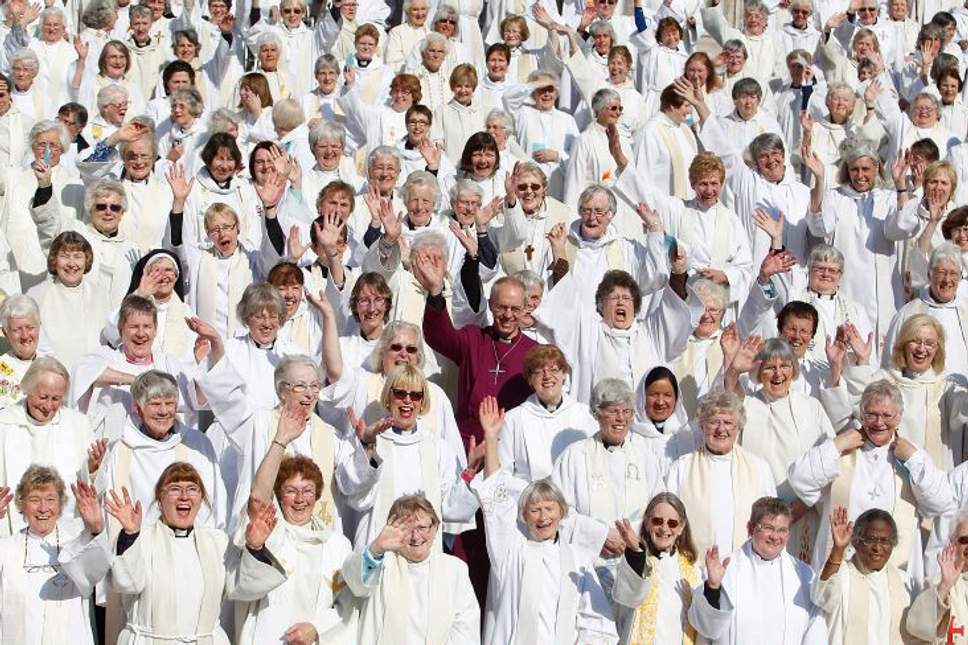
One summer Sunday afternoon in 1988, I was in the provost’s vestry of Bradford Cathedral, assisting the Bishop of Bradford to robe. I often did this, since as the junior member of clergy I was the bishop’s chaplain when he visited the cathedral. What was out of the ordinary that day was the group of people gathered there. Along with the bishop, Roy Williamson, and the Provost, Brandon Jackson, were David Penman, Archbishop of Melbourne (Australia); and Desmond Tutu, Archbishop of Cape Town (South Africa). The latter two were in England for the Lambeth Conference. Archbishop Tutu was scheduled to preach at the cathedral evensong before we all went on to a mass rally at Valley Parade football ground, where Archbishop Tutu would be speaking again.
This group of powerful men began discussing the vexed question of women’s ordination. South Africa and Australia had ordained their first women deacons in 1985; England in 1987. None yet ordained women as priests. The great men were discussing if and when women should be admitted to the priesthood. I listened meekly until Desmond Tutu concluded, ‘There’s no hurry.’ I spoke on impulse: ’Time passes slowly when you’re being oppressed, doesn’t it, Archbishop?’ There was a short silence. Without replying, the men turned to other topics.
The Anglican Church of Southern Africa eventually ordained women as priests in 1992, as did the Anglican Church of Australia. The Church of England followed in 1994.
I have recounted that incident in the provost’s vestry to very few people. To tell the truth, I was embarrassed at the part I had played in it; I felt that I had been impertinent to speak out as I did. After all I was a very junior member of clergy and these men were all very senior.
A few months ago, however, I did relate it to Christina Rees CBE, a founding member of the Archbishops’ Council and formerly Chair of WATCH (Women and the Church) and a member of the General Synod for 25 years. Christina had a very different take on it. It was extraordinary, she pointed out, that a group of men should discuss women’s ordination while totally ignoring the ordained (and robed) woman who was with them. Even Desmond Tutu, a noted civil rights activist, had not thought to recognise my presence or ask for my views. I was not acknowledged even when I spoke.
The idea of deference to rank was so deeply ingrained in the Church that even a good man Like Tutu could discuss women’s ordination in front of an ordained woman while completely ignoring her. They certainly did not think they had anything to gain by hearing my perspective on the matter. The arrogance of this ought to be breathtaking, yet it betrays something of the culture of the Church.
In my first year of training at Wycliffe there were only 5 of us women, and 95 men. My fellow trainee Lynda Rose recounted an incident which occurred during a mission she was on in the spring of 1985. One of the local people enquired of the tutor leading the group whether the Wycliffe women then training to be deacons had aspirations to the priesthood. No, he replied immediately, they hadn’t. Lynda promptly responded that actually all 5 of us felt we were called to be priests. When the incident was discussed later the tutor’s reaction was, ‘Don’t discuss women’s ordination, it’s a minefield!’ None of the teaching staff had asked the women students regarding our vocations; they simply assumed that we didn’t want to be priests. And the lesson the tutor had taken from this was not, ‘I shouldn’t assume I know what people think before I’ve asked them,’ or even, ‘Next time I’m asked for someone’s views, I’ll let them speak for themselves.’ Instead he had labelled the whole topic as dangerous and to be avoided. Women are tricky, let’s not discuss them!
In my files I have an order paper from a long-ago General Synod, which was due to discuss the report ‘Making Women Visible’. The debate was listed instead as ‘Making Women Invisible’ – a typo which was perhaps a more honest reflection of the Church of England’s intentions.
My recent reflections have not concerned merely the behaviour of the prelates in the provost’s vestry, however. In 1988 I was already a feminist and I later became an activist, but for more than 30 years I had never questioned my feeling that I should not have spoken out. In fact, my shame at having done so had kept me silent all that time. I have come to see that that too is extraordinary. I come from a nonconformist and independent-minded background and had had none of the awe of the hierarchy with which many Anglicans are brought up; yet in barely a year I had internalised the view that women and junior clergy should be invisible and inaudible. No doubt my critics will say I was never very good at being silent, but the fact remains that for the whole of my ministry I felt uneasy and even guilty whenever I spoke out. And I was all too aware of the disapproval of my seniors when I did so.
IICSA identified deference as one of the reasons why abuse could so tragically flourish in our Church. It is so much a part our Church’s culture – and that of the Anglican Communion as a whole – that usually we don’t even think to question it. But it corrodes our sense of common humanity and impedes justice; what in biblical terms is called ‘righteousness’.
Deference to Peter Ball’s rank as bishop, his class and social standing, along with his immense personal magnetism, hindered many from discerning his narcissism or believing the allegations against him. Ball was a bishop and a bishop would not do such evil things. Deference means that college tutors don’t have to value their ordinands’ experience outside the Church. Deference means that bishops can pronounce on all sorts of matters of which they have no real experience, while ignoring the perspective of those who do. Deference prevents Church leaders from accepting what survivors of Church abuse have to offer.
Let’s put an end to deference. It’s destructive.







